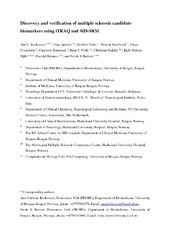Discovery and initial verification of differentially abundant proteins between multiple sclerosis patients and controls using iTRAQ and SID-SRM
Kroksveen, Ann Cathrine; Aasebø, Elise; Vethe, Heidrun; van Pesch, Vincent; Franciotta, Diego; Teunissen, Charlotte E.; Ulvik, Rune Johan; Vedeler, Christian A.; Myhr, Kjell-Morten; Barsnes, Harald; Berven, Frode
Peer reviewed, Journal article
Accepted version
Permanent lenke
https://hdl.handle.net/1956/16942Utgivelsesdato
2013-01Metadata
Vis full innførselSamlinger
- Department of Biomedicine [710]
- Department of Clinical Medicine [2065]
Originalversjon
https://doi.org/10.1016/j.jprot.2012.09.037Sammendrag
In the present study, we aimed to discover cerebrospinal fluid (CSF) proteins with significant abundance difference between early multiple sclerosis patients and controls, and do an initial verification of these proteins using selected reaction monitoring (SRM). iTRAQ and Orbitrap MS were used to compare the CSF proteome of patients with clinically isolated syndrome (CIS) (n = 5), patients with relapsing–remitting multiple sclerosis that had CIS at the time of lumbar puncture (n = 5), and controls with other inflammatory neurological disease (n = 5). Of more than 1200 identified proteins, five proteins were identified with significant abundance difference between the patients and controls. In the initial verification using SRM we analyzed a larger patient and control cohort (n = 132) and also included proteins reported as differentially abundant in multiple sclerosis in the literature. We found significant abundance difference for 11 proteins after verification, of which the five proteins alpha-1-antichymotrypsin, contactin-1, apolipoprotein D, clusterin, and kallikrein-6 were significantly differentially abundant in several of the group comparisons. This initial study form the basis for further biomarker verification studies in even larger sample cohorts, to determine if these proteins have relevance as diagnostic or prognostic biomarkers for multiple sclerosis.
